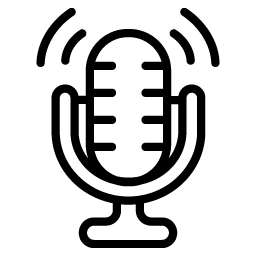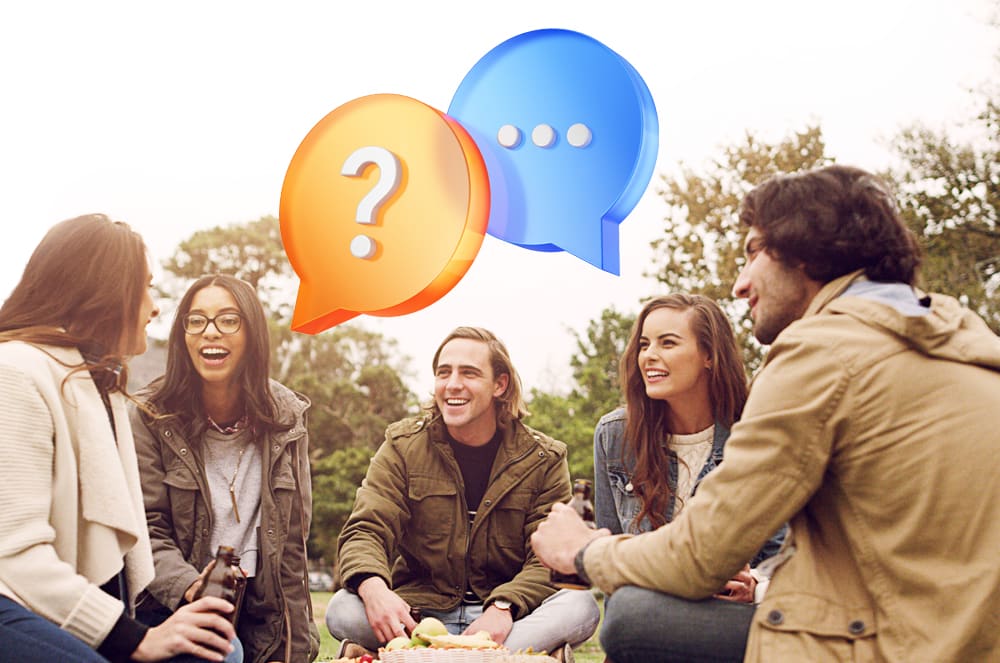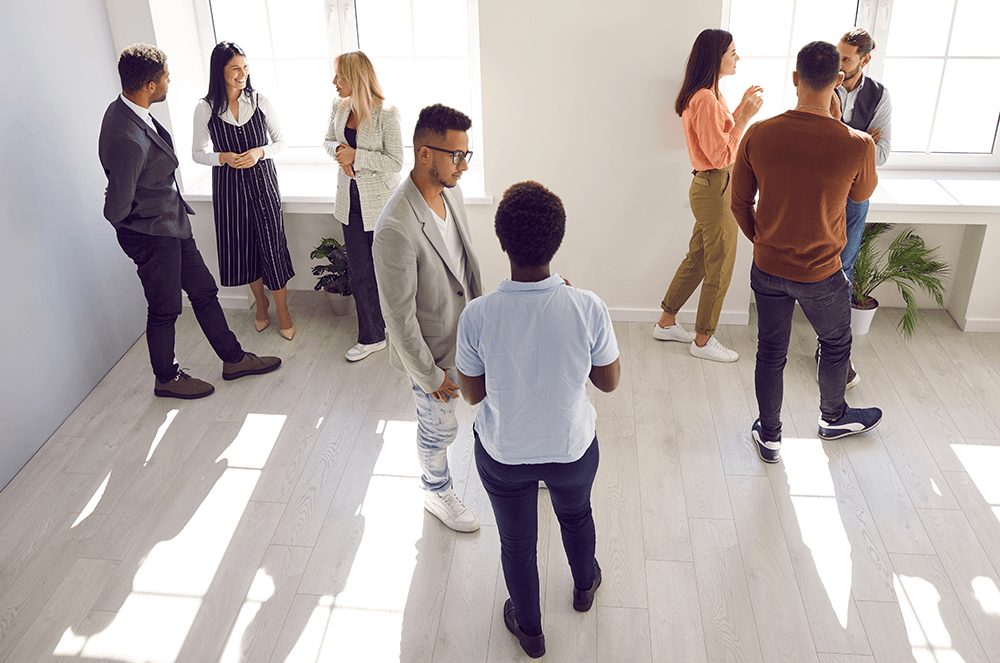



Imagine walking up to a microphone to address a room full of people. Now, imagine meeting one person in the crowd for a meal or coffee later. Though both scenarios require that you speak effectively, intimate conversation is strikingly different compared to speaking to an audience, where onlookers mostly don’t talk back.
Conversations—in coffee shops, board rooms, or around kitchen tables—ask us to take turns speaking and listening in an unfolding cascade. It’s a coordination game filled with challenges and opportunities alike, and mastering the game is the key to achieving nearly everything we want in life.
To tap the power of back-and-forth dialogue, one of the most powerful tools in your conversational toolkit is question-asking—a concept I explore in my book TALK and in this excerpt. As a scientist, teacher, and practitioner of conversation, I’ve learned that the ability to ask questions is a singular evolutionary gift. Captive primates, like bonobos, have learned to communicate with humans surprisingly well using symbols called lexigrams that represent human words. Bonobos can often answer questions, but even the most highly trained primates are unable to ask.
Meanwhile, human children ask their first questions in their babbling months, initiating requests for milk, food, and objects by pointing and making sounds with that recognizable upward-turning questioning intonation, long before they start using phrases or sentences.
Question-asking is a fundamentally human approach to conversation. It reflects our interest in others’ minds. It’s what makes human conversation possible—and remarkable.
Ask More
People don’t always think of the role questions will play in a conversation, perhaps because they sense that they need to know what to say—and think they need to assert statements to show they are knowledgeable and interesting.
But in my research, I’ve seen that asking more questions—on speed dates, sales calls, entrepreneurial pitches, and job interviews—correlates with all kinds of positive outcomes. The most obvious benefit is that question askers learn more information. When you ask, people answer, and you know something you didn’t know before.
Asking more questions increases information exchange, but it also has a less obvious, and more important, benefit: It improves the relationship. People who ask more questions are better liked.
In one study, my colleagues and I brought together pairs of strangers and asked them to get to know each other in 15-minute conversations. We observed their natural question-asking behavior. Each talker tended to ask six and a half questions on average. Then we ran an experiment with a separate group of strangers.
Before they began their conversations, we gave them instructions. For half the pairs, we told one talker to ask a lot of questions (more than nine questions in 15 minutes), and for the other half, we told one talker to ask very few questions (fewer than four questions in 15 minutes). We didn’t tell them what kinds of questions to ask or give them any other instructions—they could talk about whatever they wanted, however they wanted, to maximize enjoyment.
We found those who asked a lot of questions were significantly better liked by their partner than were those who asked few.

Listen to part one of Alison Wood Brooks’ interview on The Toastmasters Podcast.
In cooperative conversations—like romantic dates or hanging with friends—and conflictual conversations—like sales calls and negotiations—alike, asking more questions leads to better outcomes (like more second dates, more fun, and more money). People who ask more questions are better liked by their partners, and they learn more information.
The rewards of asking questions are so powerful that it’s difficult to ask too many questions—and often impossible. Researchers suspect that in cooperative conversations, it may be impossible to ask too many questions because people have so much to learn about each other’s lives and perspectives.
Even in conflictual conversations, the tipping point where “many questions” becomes “too many” is quite extreme (four questions per minute). This extremely high level of question-asking is still better than asking too few.
The Dreaded Zero Questioner
Though question-asking increases learning, enjoyment, and likability, research shows most people don’t do nearly enough of it. Even in contexts that are designed for probing for information—meetings, dates, job interviews, office hours—people often ask very few questions.
Professional matchmaker Rachel Greenwald calls the worst offenders “ZQs”—those who ask zero questions. Greenwald’s seen it all. She makes her livelihood from arranging, studying, and mentoring thousands of daters.
You don’t need to be a professional to understand the problem with ZQs, she says. We’ve all encountered them: the woman who talks endlessly about her kids; the old man who perpetually tells stories about his life; the boss who runs a meeting just to talk at his employees; the date who doesn’t so much as ask, “How was your day?” At one point during these conversations, it may dawn on you that the person hasn’t asked you a single question, and then the conversation becomes a potentially frustrating or distracting game to see if they will.
Question-asking is a fundamentally human approach to conversation.
In Greenwald’s words, “People say curiosity killed the cat. But when it comes to dating, curiosity is king: It’s the ZQs that killed the date. Zero questions means zero second dates.”
Thankfully, most of us aren’t ZQs. But don’t breathe easy just yet—we’re probably closer than we realize. People vastly overestimate how many questions they ask during their conversations. Negotiators, for example, estimated that more than 50% of the times they spoke they asked a question. In reality, less than 10% of their turns included a question. We’ve found the same pattern in conversations between friends and on first dates, too.
If you find it difficult to ask lots of questions, you can aim lower—just don’t be a ZQ. You should never leave a conversation having asked no questions at all. Easy questions include “What was that like for you?” or “Was that hard?” or “What did you like about that?” or “What are you excited about these days?”

Listen to part two of Alison Wood Brooks’ interview on The Toastmasters Podcast.
Asking Better Questions
When it comes to asking questions in conversation, it’s not just about asking more, but also better, questions. One superhero question type is follow-ups—questions that probe for more information based on something your partner has already said. They show that you’ve listened to your partner, care about them, and want to know more. Even quick phrases like “Can you say more about that?” or “How does that make you feel?” will almost always make the conversation better.

Similarly, open-ended questions that start with the word “what,” as in, “What’s on your mind today?” or “What did you have for breakfast?” or “What do you think about cell phones these days?” often strike a good balance between drawing information out of your partner to learn about them and intimidating them or making them feel like you’re going to judge them for their answer. On the other hand, “why” questions (such as “Why do you eat cereal?” or “Why do you like soccer?”), though also open-ended, can feel more accusatory.
In our quest to ask great questions like follow-ups and open-ended “what” questions, we should beware of a common pattern of question-asking I call “boomerasking,” named after the outgoing and returning arc of a boomerang. This is when you ask a question, let the other person answer, and then immediately bring the conversation back to yourself: “How was your weekend?” … (partner answers) … “Well, I met Amy Poehler this weekend!”
Sharing information about ourselves is important to maintain the ping-ponginess of good conversation, but the key is in the timing. Before sharing your own brag, complaint, or neutral disclosure, if your partner has shared something with you, you should follow up with them first—to show you’re not just asking to ask, but because you actually want to hear their answers.
Use the superpower of genuine question-asking in your next one-on-one conversation. Of course, a conversation should allow both participants to speak, but asking more questions of your partner will benefit you both. You’ll learn more about them and they’ll have a positive impression of you. Across all the conversations in your life and career, these rewards add up. Are you ready to reap the rewards of asking more, and better, questions? Enough throat-clearing then. Get asking!
Alison Wood Brooks is a Harvard associate professor and author of TALK: The science of conversation and the art of being ourselves.
Related Articles

Communication
Be Confident in Casual Conversations

Presentation Skills
Consider Questions a Speaker’s Best Tool

Communication
Strengthen Your Conversation Skills

Personal Growth



 Previous
Previous

 Previous Article
Previous Article